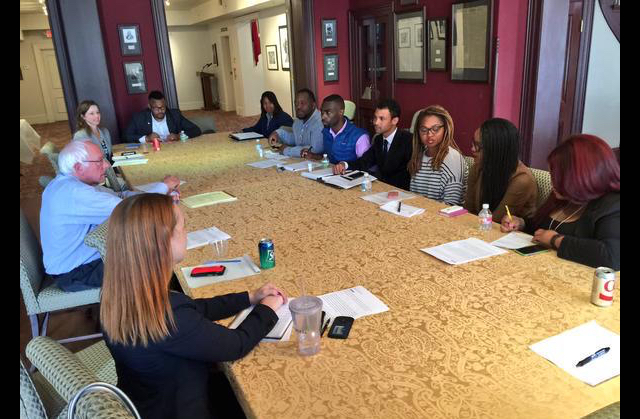READ: DeRay Mckesson Reveals Details of Bernie Sanders, Hillary Clinton Meetings

Ferguson-based activist DeRay Mckesson and other activists recently met with democratic presidential candidates Hillary Clinton and Bernie Sanders to discuss the Black Lives Matter movement and what the next president can do to eradicate police violence, using #CampaignZero as a starting point for policy.
Yesterday, Mckesson took to Medium.com to reveal the details of those conversations and offer his take on the candidates’ performances during Tuesday’s debate. Mckesson also revealed that activists have requested meetings with Martin O’Malley, Marco Rubio and Ben Carson. The entire essay is worth a read, but here are a few choice passages:
On encouraging Sanders to think again about the concept of “community policing”:
We pushed him to re-think “Community Policing” as this term suggests that the police should be ever-present in black communities—patrolling, tutoring, playing basketball, etc.—sustaining the notion that police presence is what makes people safe. We noted that this idea of “Community Policing” is rarely, if ever, applied to white or wealthy communities—that if these communities had an ever-present police presence, it would be unacceptable.
On the important difference between the racial income gap and the racial wealth gap:
Sen. Sanders has a long history of discussing economic justice and often focuses on income. We pushed him to think about the racial wealth gap as a clearer indicator of ending inequity…. We noted that, for example, bringing families below the poverty line up to the poverty line still means that these families are likely living paycheck-to-paycheck and that a focus on income and not wealth masks the depth(s) of inequity.
On how they broke down to Sanders the importance of being specific when it comes to legislation meant to help people of color:
A jobs bill that creates 19 million jobs is important. But a specific focus on racial equity is needed to ensure that people of color will actually benefit from such a bill. A range of barriers (racial bias in the hiring process, discrimination based on past criminal records, and lack of access to housing, childcare, education, and transportation) could prevent black people from being able to participate in this program unless intentional measures are taken to ensure access.
On reframing Clinton’s view of the federal government’s role in policing:
In our conversation about the kinds of actions HRC would take as President to reform the criminal justice system, Clinton commented that many aspects of the criminal justice system are primarily managed by state and local governments. We pushed her to develop a criminal justice platform that leveraged the power that the federal government has to set the national agenda, model effective policy, and push state and local governments into alignment with that vision, and intervene where necessary to secure the rights and liberties of black people. Later in the meeting, she articulated a national model for policing as one such idea.
On Clinton’s tactics for legislating racial equity:
We discussed using funding formulas as a means to direct resources to disinvested black communities. HRC shared with us that she supported this strategy and had pushed for the 10–20–30 formula presented by Rep. James Clyburn during the debate of the Recovery Act. This design would disproportionately award formula funding to communities suffering high poverty rates for the past 30 years, the vast majority of which are communities of color.
